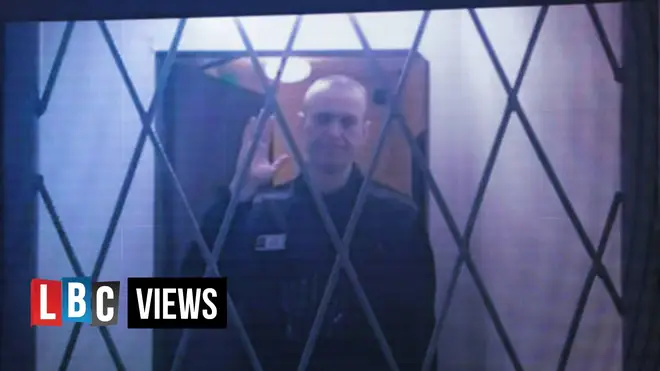
Oli Dugmore 4am - 7am
16 February 2024, 22:04 | Updated: 16 February 2024, 22:18

Even in Siberia, Alexei Navalny never lost hope.
The Russian opposition leader, who has bravely denounced Vladimir Putin’s authoritarian regime, was sent to a Siberian penal colony at the end of 2023.
Navalny was serving out a 19-year prison sentence. The charges—which included “extremism,” the “rehabilitation of Nazis” and “inciting children to dangerous acts”—were widely dismissed as fabricated and unlawful.
Navalny was a political prisoner: He had campaigned against Kremlin corruption, condemned the war in Ukraine and called on Russians to protest against Putin. In 2020, he fell into a coma after being poisoned. The Kremlin was thought to have been behind the assassination attempt. (It denied the accusations.)
Amnesty International, a human rights group, considered Navalny “a prisoner of conscience”.
Navalny's conscience looked indestructible. Siberian prisons are cold and harsh and unforgiving. And yet Navalny didn’t give up after his transfer last December to the IK-3 penal colony, which is located north of the Arctic Circle.
The dissident held on to his dream that Russia would be free. And he kept communicating with the outside world by handing notes to his lawyers, who would post them on his Instagram account.
Only two days ago, on Valentine’s Day, Navalny wrote a message to his wife, Yulia Navalnya, who lives in Europe. “Between us there are cities, the take-off lights of airfields, blue snowstorms and thousands of kilometres,” he lamented. But, Navalny added, “I feel that you are near every second, and I love you more and more.”
Today, Yulia Navalnya became a widow.
Navalny died on Friday, according to the Russian prison service. In a statement, it said that Navalny took a walk in the prison yard and passed out immediately after.
“All the essential measures to resuscitate him were carried out and did not give positive results,” the prison service continued.
“Emergency services doctors confirmed the inmate’s death. The reasons for his death are being clarified.”
But while the exact reasons for Navalny’s death are still unknown, it is clear where the blame lies.
“If it’s true, then it’s not ‘Navalny died,’ but ‘Putin killed Navalny,’ nothing else,” said Leonid Volkov, the chief of staff for Navalny.
Ukrainian president Volodymyr Zelenskyy put it plainly: “It is obvious Alexei Navalny was killed by Putin.”
US vice president Kamala Harris, who was attending the Munich security conference, warned: “Whatever story [Russian authorities] tell, let us be clear, Russia is responsible.”
As such, Russia must face consequences on the international stage. British foreign secretary Lord David Cameron was unequivocal.
“Putin should be held accountable for what has happened,” he wrote on X, adding “no one should doubt the dreadful nature of his regime”.
As experts have already pointed out, the timing of Navalny’s death does not appear coincidental. Russia is set to hold presidential elections next month, and it seems inevitable that Putin will win.
Ever since Russia invaded Ukraine in February 2022, the opposition has been systematically suppressed. Some Putin critics have fled Russia. Others have been imprisoned.
Among them is Vladimir Kara-Murza. A dual British-Russian citizen, he has long been standing up to the Kremlin and fighting for democracy and human rights in Russia.
Kara-Murza survived two poisonings in 2015 and 2017. And in April 2023, he was thrown in jail for 25 years for “treason” and sharing “false information” on the Russo-Ukrainian war.
Kara-Murza is now languishing in a penal colony in Siberia.
The United Kingdom must do everything in its power to negotiate his release and spare him the same tragic fate as Alexei Navalny.
LBC Views provides a platform for diverse opinions on current affairs and matters of public interest. The views expressed are those of the authors and do not necessarily reflect the official LBC position. To contact us email views@lbc.co.uk